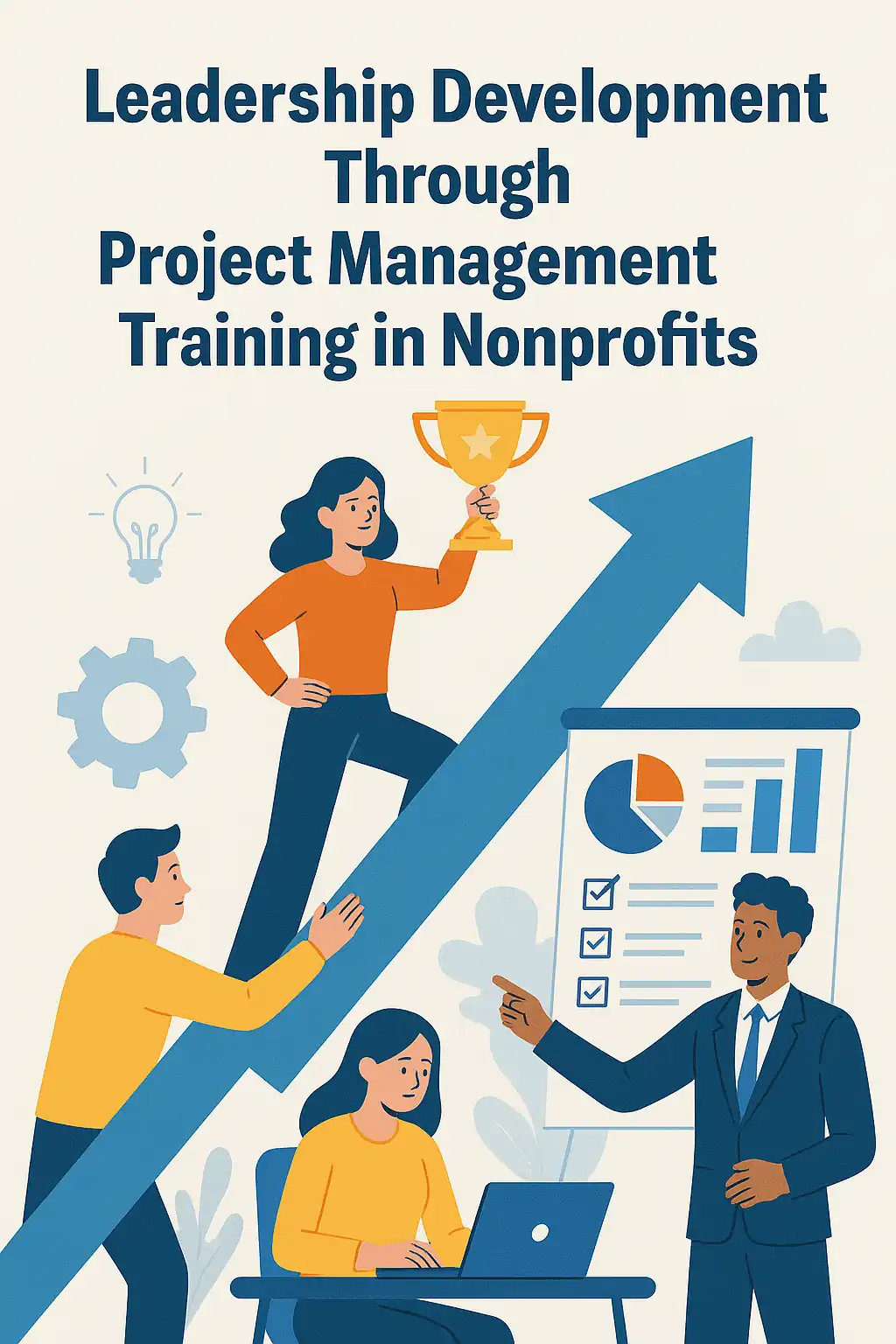Introduction to Project Management in Nonprofits
Project management is a structured approach to planning, executing, and overseeing projects to achieve specific goals within a defined timeframe and budget. In the nonprofit sector, effective project management is crucial as it helps organizations maximize their resources, enhance their impact, and ensure accountability to stakeholders. The relevance of project management in nonprofits can be summarized as follows:
- Resource Optimization: Nonprofits often operate with limited resources, making it essential to manage projects efficiently to achieve desired outcomes without overspending. Project management techniques enable organizations to allocate resources effectively, ensuring that every dollar spent contributes to their mission.
- Goal Alignment: Nonprofits typically have specific missions and objectives. Project management helps align projects with these goals, ensuring that all efforts contribute to the overarching mission of the organization. This alignment is vital for maintaining focus and measuring success.
However, nonprofit organizations face unique challenges that can complicate project management efforts:
- Limited Funding: Many nonprofits rely on grants and donations, which can be unpredictable. This financial uncertainty necessitates careful planning and management of projects to ensure sustainability and impact.
- Volunteer Management: Nonprofits often depend on volunteers, who may have varying levels of commitment and expertise. Managing a diverse team of volunteers requires strong leadership and project management skills to ensure that everyone is working towards the same goals.
- Stakeholder Engagement: Nonprofits must engage various stakeholders, including donors, beneficiaries, and community members. Effective project management involves clear communication and collaboration with these groups to ensure their needs and expectations are met.
Given these challenges, the development of leadership skills through project management training is essential for aspiring nonprofit leaders. By acquiring project management skills, leaders can:
- Enhance Decision-Making: Project management training equips leaders with the tools to make informed decisions based on data and analysis, which is crucial in navigating the complexities of nonprofit work.
- Foster Team Collaboration: Effective project management encourages collaboration among team members, helping leaders to build cohesive teams that can work together towards common goals.
- Improve Accountability: Leaders trained in project management are better equipped to set clear objectives, monitor progress, and evaluate outcomes, fostering a culture of accountability within their organizations.
The Importance of Leadership in Nonprofits
Effective leadership is a cornerstone of success in nonprofit organizations. It encompasses a range of skills and attributes that enable leaders to inspire, guide, and mobilize their teams towards achieving the organization’s mission. In the nonprofit context, effective leadership can be defined by several key characteristics:
- Vision and Strategic Planning: Nonprofit leaders must possess the ability to articulate a clear vision and develop strategic plans that align with their mission. This involves setting measurable goals and ensuring that all team members understand their roles in achieving these objectives [1].
- Financial Management and Fundraising: Strong leaders are adept at managing finances and securing funding. They understand the importance of financial sustainability and are skilled in fundraising strategies that support the organization’s goals [1].
- Communication and Team Building: Effective leaders excel in communication, fostering an environment of collaboration and trust. They build strong teams by encouraging open dialogue and valuing diverse perspectives, which is essential for problem-solving and innovation [7].
The impact of strong leadership on organizational success cannot be overstated. Leaders who embody these qualities not only drive their teams towards achieving immediate goals but also cultivate a culture of accountability and excellence. This, in turn, enhances the organization’s ability to fulfill its mission and create lasting societal change. Research indicates that effective nonprofit leaders set clear goals, inspire their teams, and align their efforts with the organization’s mission, leading to improved outcomes and greater community impact [9].
One of the most effective ways to cultivate leadership skills in aspiring nonprofit leaders is through project management training. Project management provides a structured approach to planning, executing, and evaluating projects, which is crucial for nonprofit organizations that often operate with limited resources. By developing project management skills, leaders can:
- Enhance Organizational Efficiency: Training in project management equips leaders with tools to streamline processes, allocate resources effectively, and manage timelines, ultimately leading to more successful project outcomes [4].
- Foster Collaboration and Team Dynamics: Project management emphasizes teamwork and collaboration, allowing leaders to practice and refine their interpersonal skills. This experience is invaluable in building cohesive teams that work well together towards common goals [7].
- Drive Accountability and Results: Leaders trained in project management learn to set clear objectives, monitor progress, and evaluate results. This focus on accountability helps ensure that projects align with the organization’s mission and that resources are used effectively [10].
Key Project Management Skills Essential for Nonprofit Leaders
Effective leadership is crucial for achieving mission-driven goals. Project management training equips aspiring nonprofit leaders with essential skills that not only enhance their ability to manage projects but also significantly contribute to their overall leadership development. Here are some key project management skills that are vital for nonprofit leaders:
1. Planning and Strategic Thinking
- Skill Overview: Effective planning involves setting clear objectives, defining tasks, and allocating resources efficiently. It requires a strategic mindset to align projects with the organization’s mission and goals.
- Leadership Impact: Leaders who excel in planning can foresee potential challenges and opportunities, enabling them to make informed decisions that guide their teams toward success. This foresight fosters a proactive leadership style that inspires confidence among team members and stakeholders [7].
2. Communication Skills
- Skill Overview: Strong communication is essential for articulating project goals, engaging with stakeholders, and fostering collaboration within teams. This includes both verbal and written communication, as well as active listening.
- Leadership Impact: Nonprofit leaders who communicate effectively can build strong relationships with donors, volunteers, and the community. This ability to convey a compelling vision and motivate others is crucial for rallying support and driving initiatives forward [2][9].
3. Risk Management
- Skill Overview: Identifying, assessing, and mitigating risks is a fundamental aspect of project management. This skill involves anticipating potential obstacles and developing strategies to address them.
- Leadership Impact: Leaders skilled in risk management can navigate uncertainties with agility, ensuring that their organizations remain resilient in the face of challenges. This capability enhances their decision-making and instills a sense of security within their teams [4].
4. Team Development and Motivation
- Skill Overview: Effective project management involves not only managing tasks but also nurturing team dynamics. This includes motivating team members, recognizing their contributions, and fostering a collaborative environment.
- Leadership Impact: Leaders who prioritize team development create a culture of trust and engagement, which is essential for high-performing teams. This skill translates into improved morale and productivity, ultimately leading to better project outcomes [5].
5. Data-Driven Management
- Skill Overview: Utilizing data to inform decisions is increasingly important in project management. This involves analyzing performance metrics and outcomes to guide future actions.
- Leadership Impact: Leaders who embrace data-driven management can make evidence-based decisions that enhance organizational effectiveness. This analytical approach fosters accountability and continuous improvement within the organization [5][8].
Benefits of Skilled Project Managers in Nonprofits
Nonprofits that invest in project management training for their leaders can reap significant benefits:
- Enhanced Project Outcomes: Skilled project managers can lead initiatives that are completed on time and within budget, maximizing the impact of the organization’s resources [4].
- Increased Stakeholder Engagement: Effective communication and relationship-building skills enable nonprofit leaders to engage more meaningfully with donors and the community, leading to increased support and collaboration [2].
- Stronger Organizational Resilience: By developing risk management capabilities, nonprofits can better navigate challenges and adapt to changing circumstances, ensuring long-term sustainability [4][9].
Training Approaches for Developing Project Management Skills
In the nonprofit sector, effective project management is crucial for achieving organizational goals and maximizing impact. Aspiring nonprofit leaders can significantly enhance their leadership capabilities through targeted project management training. Here are some effective training approaches that can help develop these essential skills:
1. Training Options
- Workshops: Interactive workshops provide hands-on experience and foster collaboration among participants. These sessions often cover key project management principles, tools, and techniques, allowing attendees to engage in discussions and group activities that simulate real-world scenarios. Workshops can be tailored to address specific challenges faced by nonprofits, making them highly relevant for participants [5].
- Online Courses: With the rise of digital learning, online courses have become a popular option for nonprofit leaders seeking flexibility. These courses often include video lectures, quizzes, and discussion forums, allowing learners to progress at their own pace. Many platforms offer specialized courses in project management that cater specifically to the nonprofit sector, ensuring that the content is applicable and practical [3][9].
- Mentorship Programs: Pairing aspiring leaders with experienced mentors can provide invaluable insights and guidance. Mentorship programs allow for personalized learning experiences where mentees can discuss challenges, seek advice, and gain feedback on their project management approaches. This one-on-one interaction can significantly enhance the learning process and help build confidence in leadership roles [4].
2. Importance of Practical Experience and Simulations
While theoretical knowledge is essential, practical experience is equally important in developing project management skills. Engaging in simulations and real-life projects allows aspiring leaders to apply what they have learned in a controlled environment. This hands-on approach helps reinforce concepts and prepares them for the complexities of managing actual projects.
- Simulations: Participating in project management simulations can help leaders understand the dynamics of team collaboration, resource allocation, and problem-solving under pressure. These exercises mimic real-world challenges, enabling participants to practice decision-making and strategic thinking in a safe setting [1].
- Real-World Projects: Involvement in actual nonprofit projects, whether through internships or volunteer opportunities, provides practical experience that is invaluable for leadership development. Working on live projects allows aspiring leaders to navigate the intricacies of project management, from planning and execution to evaluation and reporting [6].
3. Resources and Organizations Offering Training
Several organizations and resources are dedicated to providing project management training tailored for nonprofits. These include:
- PMI Educational Foundation: This organization offers various resources and training programs specifically designed for nonprofits, including workshops and certification courses that focus on project management principles [15].
- Local Community Colleges and Universities: Many educational institutions provide project management certificate programs that cater to nonprofit professionals. These programs often combine theoretical knowledge with practical applications, ensuring a comprehensive learning experience [15].
- Bridgespan’s Leadership Accelerator: This initiative helps nonprofit leaders develop customized approaches to leadership and project management. It offers tools and resources that can be adapted to the specific needs of organizations, fostering a culture of continuous learning and improvement [13].
By leveraging these training approaches and resources, aspiring nonprofit leaders can cultivate the project management skills necessary for effective leadership. This investment in their development not only enhances their capabilities but also contributes to the overall success and sustainability of their organizations.
Real-World Examples of Leadership Development through Project Management in Nonprofits
Project management training has emerged as a vital tool for leadership development within the nonprofit sector. By equipping aspiring leaders with essential skills, nonprofits can enhance their organizational effectiveness and foster a culture of growth and innovation. Here are some compelling case studies and outcomes that illustrate the successful application of project management training in nonprofits.
Case Studies of Nonprofits Implementing Project Management Training
- Leadership Dawgs: This initiative focuses on helping University of Georgia alumni develop their leadership skills through structured training programs. Participants engage in guided self-reflection and volunteer work, which not only enhances their project management capabilities but also prepares them for leadership roles within the nonprofit sector. The program emphasizes the importance of practical experience in developing effective leaders [2].
- Nonprofit Leadership Growth Program (NLGP): This pioneering initiative aims to elevate the capabilities of current and aspiring leaders in the nonprofit sector. By integrating project management training into its curriculum, NLGP has successfully equipped leaders with the tools necessary to manage projects effectively, thereby enhancing their leadership skills and overall impact within their organizations [10].
Outcomes of Project Management Training on Leadership Development
- Enhanced Team Leadership Skills: Many nonprofits have reported significant improvements in team leadership and management skills as a result of project management training. This training often includes apprenticeship programs that allow participants to apply their learning in real-world scenarios, fostering a deeper understanding of effective leadership practices [3].
- Increased Organizational Effectiveness: Organizations that have adopted project-based learning (PBL) methodologies have found them to be particularly effective in enhancing team members’ strengths. This approach not only ignites leadership potential but also contributes to the overall effectiveness of the organization by ensuring that projects are managed efficiently and goals are met [6].
- Stronger Connections within Teams: Effective project management training encourages leaders to establish strong connections with their project teams and other organizational interfaces. This relational aspect of leadership is crucial for managing projects and programs successfully, leading to improved collaboration and communication within the organization [4].
Testimonials from Leaders Benefiting from Project Management Training
Leaders who have undergone project management training often share transformative experiences that highlight the value of these programs. For instance, one participant noted, “The project management training I received not only improved my ability to manage projects but also helped me develop a more strategic approach to leadership. I now feel more confident in my role and better equipped to lead my team towards our goals.”
Another leader emphasized the importance of the training in their professional growth: “Through the project management training, I learned how to effectively communicate with my team and stakeholders, which has been instrumental in driving our projects forward. It has truly changed the way I approach leadership.”
Overcoming Barriers to Project Management Training in Nonprofits
Effective project management is crucial for achieving mission-driven goals. However, many aspiring nonprofit leaders encounter significant barriers when it comes to accessing project management training. Understanding these challenges and implementing strategies to overcome them can pave the way for enhanced leadership development.
Identifying Barriers
- Limited Resources: Nonprofits often operate on tight budgets, which can restrict their ability to invest in training programs. This financial constraint can lead to a lack of access to quality project management training, hindering the development of essential skills among staff and volunteers [1].
- Time Constraints: Many nonprofit professionals juggle multiple responsibilities, leaving little time for training. The pressing demands of daily operations can make it difficult to prioritize professional development, resulting in missed opportunities for skill enhancement [1].
- Lack of Awareness: There is often a misconception that project management training is only relevant for larger organizations or specific sectors. This lack of awareness can prevent nonprofit leaders from recognizing the value of these skills in improving organizational efficiency and effectiveness [1].
Strategies for Overcoming Challenges
- Prioritizing Training: Nonprofits should recognize the long-term benefits of investing in project management training. By prioritizing this training, organizations can enhance their operational capabilities, leading to better project outcomes and ultimately fulfilling their missions more effectively [1].
- Seeking External Funding: Many nonprofits can explore grants and partnerships that specifically support training and capacity-building initiatives. By seeking external funding, organizations can alleviate some of the financial burdens associated with training programs, making them more accessible [1].
- Encouraging a Culture of Continuous Learning: Fostering an environment that values ongoing education can significantly enhance the skills of nonprofit leaders. By promoting a culture of continuous learning, organizations can encourage staff to pursue project management training and other professional development opportunities, ultimately leading to improved leadership capabilities [1].
Conclusion: The Path Forward for Aspiring Nonprofit Leaders
Effective leadership is paramount for driving mission success and creating meaningful societal change. One of the most critical components of strong leadership is the mastery of project management skills. These skills not only enhance operational efficiency but also empower leaders to inspire their teams and align their efforts with the organization’s mission. Here’s why aspiring nonprofit leaders should prioritize project management training:
- Importance of Project Management Skills: Project management skills are essential for nonprofit leaders as they facilitate strategic planning, financial management, and successful fundraising efforts. Leaders equipped with these skills can navigate complex projects, ensuring that resources are utilized effectively and goals are met. This proficiency is vital in a sector where outcomes often need to be measured against initial expectations, making project management a cornerstone of effective leadership in nonprofits [1][10].
- Taking the First Step: For those looking to enhance their leadership capabilities, pursuing project management training is a significant first step. This training can take various forms, from formal courses to workshops that cover essential topics such as communication, team building, and strategic planning. Engaging in these learning opportunities not only builds competence but also instills confidence in aspiring leaders, enabling them to tackle challenges head-on [7][8].
- Engagement with Resources and Communities: Aspiring nonprofit leaders are encouraged to actively seek out project management resources and communities. By connecting with like-minded individuals and accessing a wealth of knowledge, they can further their understanding and application of project management principles. This engagement fosters a supportive environment where leaders can share experiences, learn from one another, and collectively advance their skills [5][9].
Find out more about Shaun Stoltz https://www.shaunstoltz.com/about/.
This post was written by an AI and reviewed/edited by a human.



